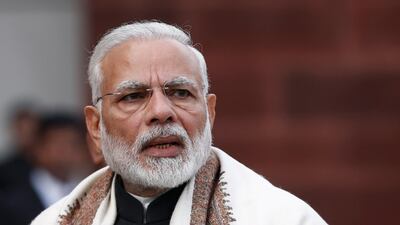Narendra Modi will become the first Indian prime minister to visit the West Bank on Saturday as he tries to maintain his country’s careful diplomatic balance in its ties with Palestine and Israel.
Mr Modi’s trip to Ramallah is the first leg of a three-day tour that will take him on to the UAE later on Saturday and then to Oman on Sunday. Mr Modi’s trip to the UAE will be his second as prime minister, after his earlier visit in August 2015.
India was the first non-Arab country to recognise the Palestine Liberation Organisation (PLO) as the legitimate representative of the Palestinian people, in 1974. Full diplomatic relations between the two countries began in 1980, and India recognised Palestine’s statehood in 1988 — four years before it established formal diplomatic ties with Israel.
The office of Mahmoud Abbas, the Palestinian president, said it considered the visit of Mr Modi — a “grand guest” — as a “historical and significant” event.
Mr Modi will fly to Amman and take a helicopter from there to Ramallah, rather than using the land route through Israel. He will hold talks with Mr Abbas, attend a banquet lunch, and lay a wreath at the Yasser Arafat Museum.
In a tweet on Thursday, he said he was looking forward to his meeting with Mr Abbas and reiterated India's support for the Palestinians.
The two leaders are expected to discuss India’s assistance in infrastructure development and employment generation in Palestine, the external affairs ministry in New Delhi said. Among the ongoing projects in these areas, with a combined investment of US$30 million (Dh11m), is the construction of an India-Palestine tech park, the ministry said.
Ordinarily, leaders who undertake state visits Israel make it a point to travel to Palestine as well. But Mr Modi omitted the visit to Ramallah during his tour to Israel last July, and his camaraderie then with Prime Minister Benjamin Netanyahu spurred speculation that India as tilting decisively towards Israel.
Mr Modi’s Bharatiya Janata Party (BJP) has maintained that India and Israel are natural allies. Both countries see themselves as victims of Islamist terrorism, feeling that they are “not finding enough support in global discourse on this specific issue”, said Kabir Taneja, an associate fellow at the Observer Research Foundation (ORF), a New Delhi-based think tank.
But conjecture about a comprehensive pro-Israel tilt were undermined first by India’s support for the UN resolution that criticised US President Donald Trump’s recognition of Jerusalem as the capital of Israel, and then by Mr Modi’s planned trip to Palestine.
Mr Netanyahu professed himself “disappointed” by India’s UN vote, although he said it would not “materially” change relations between the two countries. He did not comment on Mr Modi’s plans to travel to Palestine.
“This is a standalone visit,” said B Bala Bhaskar, an official on the foreign ministry’s West Asia desk. “We have de-hyphenated our relations with Palestine and Israel, and now we see them both as mutually independent and exclusive, and as part of this policy the prime minister is undertaking this visit.”
_______________
Read more:
Israel's hopes of a brothers-in-arms relationship with India are flawed
How Narendra Modi's foreign policy manages competing strategic interests
_______________
Mr Modi has previously expressed “unwavering support” for the Palestinian cause, and on his visit he will be “reiterating and he is expressing solidarity with the Palestinian people directly”, Mr Bhaskar said.
This support is particularly welcome at this point in time, Majid El Khaldi, the diplomatic adviser to Mr Abbas, told The Hindu newspaper on Tuesday.
Given Mr Trump’s decision on Jerusalem, Mr El Khaldi said, “the US can no longer be the only mediator” between Israel and Palestine. “We are asking the European Union and EU countries to mediate, and we are inviting India, which will be a strong leader in a multipolar world, to assist the process.”
India’s own Muslim population, of roughly 180 million people, as well as its energy needs have played large roles in the country’s active diplomacy with Arab states.
“We have to remember that any change in Indian policy on Palestine will be commanded by domestic politics, not India's foreign policy narrative,” Mr Taneja said.
Mr Modi’s government is unlikely to dramatically shift the diplomatic balance between Israel and Palestine that India has pursued for at least three decades now, he pointed out.
“Let’s not forget that before Modi visited Israel last year, he hosted Abbas in New Delhi as well, hence maintaining that balance,” he said.
_______________
Read more:
India wants to collaborate with UAE on exports to 'Africa, Central America and Central Asia'
UAE and Indian scientists to discuss nano satellites and Mars mission plans
_______________

